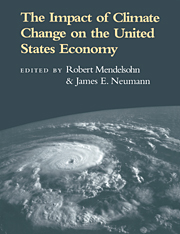Book contents
- Frontmatter
- Contents
- List of Contributors
- Acknowledgements
- 1 Introduction
- 2 Economic effects of climate change on US agriculture
- 3 The impact of climate variation on US agriculture
- 4 Climate change and agriculture: the role of farmer adaptation
- 5 The impacts of climate change on the US timber market
- 6 Economic effects of climate change on US water resources
- 7 The economic damage induced by sea level rise in the United States
- 8 The impact of global warming on US energy expenditures
- 9 The economic impact of climate change on the US commercial fishing industry
- Introduction to recreation
- 10 The impact of climate change on outdoor recreation
- 11 Estimated effects of climate change on selected outdoor recreation activities in the United States
- 12 Synthesis and conclusions
8 - The impact of global warming on US energy expenditures
Published online by Cambridge University Press: 21 October 2009
- Frontmatter
- Contents
- List of Contributors
- Acknowledgements
- 1 Introduction
- 2 Economic effects of climate change on US agriculture
- 3 The impact of climate variation on US agriculture
- 4 Climate change and agriculture: the role of farmer adaptation
- 5 The impacts of climate change on the US timber market
- 6 Economic effects of climate change on US water resources
- 7 The economic damage induced by sea level rise in the United States
- 8 The impact of global warming on US energy expenditures
- 9 The economic impact of climate change on the US commercial fishing industry
- Introduction to recreation
- 10 The impact of climate change on outdoor recreation
- 11 Estimated effects of climate change on selected outdoor recreation activities in the United States
- 12 Synthesis and conclusions
Summary
One important impact of global climate change is the effect on energy use. In particular, the residential and commercial energy sectors are expected to be sensitive to climate change due to the impact that climate has on space conditioning. Through changes in space heating and cooling requirements, climate change will play a role in shaping the pattern of energy use in these sectors over the next century. We expect these sectors to adjust energy use as well as space conditioning capital such as heating and cooling equipment, insulation, and conservation features in adapting to climate change. Global warming is expected to yield heating benefits due to the reduced energy and building expenditures necessary to keep interior temperatures at desirable levels in cool locations and seasons. In warm locations and seasons, warming will entail additional cooling costs that include expenditures on energy, building characteristics, and cooling capacity. The net impact of climate change on the energy sector will depend on whether the heating benefits or the cooling damages dominate under a climate change scenario.
To date, all estimates of climate–energy interactions rely on expert opinion, engineering studies, and business–industry studies, focusing heavily on electricity impacts. In addition, theoretical models which lay out the welfare effect from warming have not yet been proposed for the energy sector. This chapter presents the first comprehensive theoretical–empirical model of the impact of climate change on the US energy sector.
- Type
- Chapter
- Information
- The Impact of Climate Change on the United States Economy , pp. 209 - 236Publisher: Cambridge University PressPrint publication year: 1999
- 7
- Cited by

